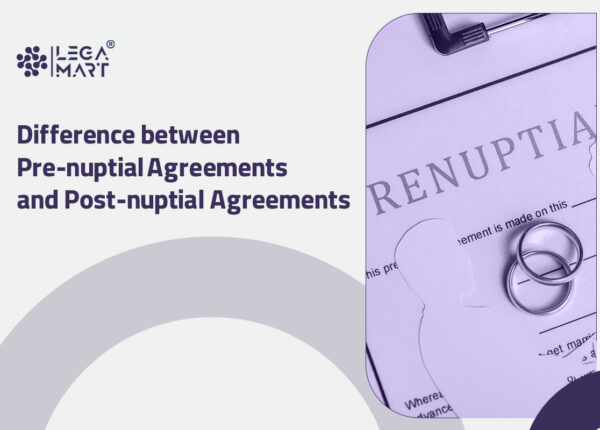Introduction
Did you know that David Arquette and Courteney Cox had entered a postnuptial agreement that helped them during their divorce proceedings? As part of the broader scope of Legal Practice & Specialization, a postnuptial agreement could have benefitted someone like Jeff Bezos and his now ex-wife Mackenzie Bezos, especially considering the amount of wealth involved in the proceedings.
However, what exactly is a postnuptial agreement? Consider the following situation: Bill and Amelia have been married for 5 years and have successful careers. While Bill owns his property, which provides him with a significant monthly rental income, Amelia has invested in a tech startup that has been very successful recently. Eventually, they realize that they need a mechanism to protect their assets and wish to clarify the financial arrangement in the event of divorce. Here is where a postnuptial agreement will be beneficial for the couple. Let’s see how!
Importance of Postnuptial agreement
Like prenuptial agreements, postnuptial agreements are entered into by a married couple who wishes to alleviate their financial concerns or any other concerns they might face in their married life. While such agreements are primarily concerned with the protection of money and assets, if anything concerns the state of the marriage, a postnuptial agreement can be helpful to resolve that issue as well.
While these types of agreements are less common, however, over recent years, they are becoming more popular. This is either because spouses did not enter into a prenuptial agreement before marriage or because spouses consciously decided to wait till marriage to understand the difficulties they might face during the journey.
The following are some reasons for wanting to enter into a postnuptial agreement:
If either or both parties are wealthy
Postnuptial agreements are recommended, especially if the parties have significant pre-marital assets or expect to inherit significant future assets later. A postnuptial agreement ensures that the parties can exit their union by protecting their assets.
If children from previous marriages are involved
If any or both spouses have children from a previous marriage, entering into a postnuptial agreement can help pre-determine the share of the assets that the spouse shall receive if they divorce or if the person owning the estate dies, ensuring that the inheritance remains protected. This is important because some states automatically give your estate to your current spouse without such an agreement.
If you and/or your spouse own a business
The existence of a postnuptial agreement can protect your income and assets that you would earn during the subsistence of the marriage. Without such an agreement, the ex-spouse might be allowed to gain entitlement over a percentage of the business and its earnings.
In the absence of a prenuptial agreement
You might have avoided entering a prenuptial agreement simply because it can cause unnecessary stress and doom the marriage. However, couples can prefer entering into a postnuptial agreement once they have settled into their marital routine and are much more comfortable talking to each other about such possible situations.
If one spouse stopped working after marriage
If one of the two spouses decides to stop working and stay home to raise the children, the existence of a postnuptial agreement can ensure that the spouse is financially taken care of, both during and beyond the marriage.
Therefore, a postnuptial agreement can aid in simplifying complex arguments in marriage by helping the couple be prepared for any future situation.
Pros and Cons of Postnuptial Agreements
Pros
- It helps couples to have adequate time before they get into an agreement. This agreement is more convenient for young couples who may not be prepared to conduct the essential money talks for a prenuptial agreement, as spouses’ financial judgments are frequently more assured as they age.
- Prenuptial agreements attempt to forecast the future. Postnuptial agreements concentrate on how income and assets have increased throughout the marriage, such as establishing or expanding a company, inheritances, and investment success.
- Couples with children from past marriages can safeguard their children’s rights in certain assets purchased or received during the marriage, such as family heirlooms bought or inherited throughout the marriage.
Cons
- Some couples may believe that entering a prenuptial or postnuptial agreement increases the likelihood of divorce. However, honest dialogue between spouses can reduce the damage to their relationship.
- There can be cases where both spouses do not agree on specific postnuptial agreement conditions, which might slow the process or lead to hatred. In rare circumstances, this may result in a divorce that would not have occurred otherwise.
- In postnuptial agreements, there might be a case where one spouse is the earner or has more assets; talks may not be fair. This may result in coercion or the degradation of the other spouse’s rights.
Items that are not covered under Postnuptial Agreements
A few things are not supposed to be covered under the postnuptial agreement, such as issues concerning child custody, or child support is not enforceable via a postnuptial agreement. A postnuptial agreement cannot contain provisions that aim to govern everyday parts of a married relationship.
These concerns must be addressed in the best interests of the child, and a contract agreed upon long before a divorce may not reflect the current circumstances and how they may affect the child.
Difference between Prenuptial Agreements and Postnuptial Agreements

Both prenuptial and postnuptial agreements are used to achieve similar goals, i.e., taking care of potential issues and difficulties in a marriage. However, both documents can have distinct differences.
A prenuptial agreement is drafted and executed before the marriage. The agreement establishes the division of assets, financial rights, and other possible disagreements that may arise during divorce. This agreement is also used to protect family businesses, shared debt situations, and the financial responsibilities division during the marriage.
On the other hand, postnuptial agreements are executed after marriage. They may be entered into at any stage of the marriage, wherein the parties make a fair disclosure about their financial circumstances and the division of assets and liabilities in the event of divorce. The agreement may also specify the children’s responsibilities and obligations of each parent, which is impossible to do in a prenuptial agreement.
It has been seen that postnuptial agreements are gaining more recognition over recent years. For instance, since the adoption of “no-fault” divorce laws (wherein the spouse does not have to prove the fault of the other spouse for obtaining a divorce) in the US, postnuptial agreements are preferred over prenuptial agreements.
Common Clauses of Postnuptial Agreements

Some of the commonly included provisions in the agreement are:
- Asset division. The couple is expected to provide a fair disclosure about their assets (both current and expected), along with providing a plan on how they wish to divide the assets and liabilities of the properties and income in the event of divorce. Therefore, ensure that you mention the share of each spouse.
- Marital debts. If the married couple gains assets during the marriage, they might also gain debts. While these debts may be for credit cards, they may also include mortgages, annual subscriptions, shared monthly bills, etc. Therefore, ensure that you mention how the debts shall be handled. Usually, such shared debts are divided in half by both parties.
- Spousal support. If the parties adequately negotiate that one of the spouses would require support after the marriage ends, they must include that in the agreement.
- Child care/support. If the couple has children during marriage, they can include a section related to their care and support within the postnuptial agreement. The agreement may also be used to negotiate and state the days of the week/month when each parent shall keep the children.
- Asset distribution after death. The agreement may also specify what happens to the assets if any of the spouses passes away during the marriage. The agreement can mention the adequate division of assets. Typically, such a provision supersedes a testament as well.
Postnuptial Agreements in the USA
Legal validity
Enforcing a postnuptial agreement can vary across different states in the US. Generally, courts in the US tend to uphold such agreements, provided they are adequately documented, voluntarily signed and involve transparent disclosure of financial information from both parties. However, specific states impose additional hurdles in enforcing a postnuptial agreement; for example, California mandates that spouses have a fiduciary duty towards each other, necessitating that the contract embodies “the highest good faith and fair dealing” from both parties, with neither spouse exploiting the other unfairly. This requirement is outlined in Family Code Section 721 of the California Legislative Information.
Due to the relatively lower frequency of these contracts than prenuptial agreements, some states lack substantial case law specifically about them. Therefore, it is crucial to seek the assistance of a local family law attorney who possesses the necessary expertise to navigate the negotiation process and ensure the development of an agreement that can withstand scrutiny in court.
Cost
Typically, a postnuptial agreement costs approximately $2,000, with prices typically falling between $1,000 and $3,000. However, it’s important to note that this estimate applies to cases where the financial situation is relatively uncomplicated. Therefore, for couples dealing with more complex matters or residing in major urban areas, the costs can escalate significantly, ranging from approximately $7,000 to $10,000 or even higher.
Requirements
For a postnuptial agreement to be enforceable, certain conditions must be met, including;
- It must be in written form, as oral contracts lack enforceability.
- Both parties must willingly and voluntarily agree without any form of coercion. A comprehensive and transparent disclosure of all pertinent information should be conducted during execution.
- The terms outlined in the agreement must not be unjust, immoral, or excessively one-sided.
- To solidify the enforceability, both parties are required to sign the agreement, signifying their consent and commitment to the terms outlined therein.
Postnuptial Agreements in UK
Legal validity
In the UK, postnuptial agreements are not legally binding in case of a subsequent divorce. However, the terms of a postnuptial agreement can hold significant weight during a court dispute unless the agreement’s impact is deemed unfair. While a court can uphold specific provisions of a postnuptial agreement while deeming others to have an unfair impact, it is essential to note that postnuptial agreements are not always legally binding. Therefore, as the court may consider this, you must enter into a postnuptial agreement with the genuine intention of abiding by its terms.
It is also important to note that it is impossible to have a fully binding marital or civil partnership agreement regarding the division of assets upon divorce or dissolution in the UK. To increase the likelihood of the court considering the agreement to be fair and valid, both parties must provide full financial disclosure and seek independent legal advice regarding the agreement and its implications.
Cost
In the UK, the general costs associated with Postnuptial Agreements are approximately £1,815.00 (excluding VAT).
Requirements
The factors that contribute to the fairness and enforceability of postnuptial agreements in the UK can include:
- Recency and Unchanged Circumstances: Agreements are less likely to be deemed unfair if they are recent and if there have been no significant changes in circumstances since their creation.
- Informed Consent: The agreement’s fairness increases if both parties fully understand the legal and financial implications of its formation without any undue pressure or coercion.
- Proper Negotiation: Postnuptial agreements that are carefully negotiated and properly documented are more likely to be upheld by the court in the event of divorce.
- Review Provision: It is common to include provisions in the agreement for periodic reviews, such as after a specified duration or when specific trigger events occur, such as the birth of a child or health issues impacting earning capacity
Postnuptial Agreements in Canada
Legal Validity
Postnuptial agreements in Canada hold legal enforceability when they adhere to the country’s contract law. However, their validity extends beyond this requirement. While these agreements, entered into by married partners, generally maintain their binding nature, it is essential to acknowledge that they cannot supersede existing laws. Consequently, a court possesses significant discretion to assess the validity of a postnuptial agreement or any specific clause within it and may deem it invalid if necessary. This is because, before marriage, couples do not possess any specific legal rights or obligations towards their future spouse; however, on the day of their marriage, couples gain different legal rights and responsibilities concerning their spouse as per Canadian family law. Consequently, deciding to enter into a postnuptial agreement usually involves relinquishing certain legal rights. Therefore, a court in Canada will exercise additional caution when scrutinizing the circumstances under which a postnuptial agreement was made to determine its validity.
Requirements
Canadian courts, including the Supreme Court of Canada, have established criteria to evaluate the validity of such agreements. Therefore, the enforceability of a postnuptial agreement in Canada is contingent upon factors such as:
- Both parties involved in the agreement must receive transparent and comprehensive disclosures from each other, encompassing the entirety of their assets and debts.
- Adherence to applicable legislations;
- Both parties must have obtained sufficient legal advice before signing the agreement.
- Absence of coercion, duress, or undue influence; and
- Fairness and reasonableness of the agreement terms.
Comparison between USA, UK, and Canada
In the US, postnuptial agreements are recognized and enforceable in most states; equally, the requirements for validity vary by state. However, postnuptial agreements, in general, include voluntary and fair disclosure, absence of duress or coercion, and consideration (mutual promises).
Postnuptial agreements are not automatically legally binding in the UK; therefore, for a postnuptial agreement to carry weight, it should be freely entered into by both parties, with full financial disclosure, and in the presence of independent legal advice.
Postnuptial agreements in Canada hold legal recognition and can be enforced. To ensure validity, the requirements typically involve:
- Adhering to contract law.
- Providing complete financial disclosure.
- Obtaining independent legal advice for both parties.
- Avoiding coercion.
- Ensuring fairness and reasonableness in the agreement’s terms.
Conclusion
Postnuptial agreements define the rights and obligations of both partners if a divorce occurs or legal separation and can tackle matters including property allocation, partner maintenance, and parental custody. Such agreements allow married couples to determine their monetary entitlements and obligations should an eventual divorce or marital dissolution. This enables a precise and see-through settlement of possible conflicts.
In the USA, marital agreements receive acknowledgement and can be enforced in most states. These organizations allow partners to deal with matters like dividing assets, spousal support, and assigning debts.
Likewise, within the United Kingdom, spousal contracts receive a growing acknowledgement from the judiciary as contracts with legal enforceability; they provide couples independence in deciding how their property should be divided and safeguard their concerns in marriage dissolution.
In Canada, marriage agreements are legally acknowledged and binding with specific legal conditions. These contracts enable pairs to set up terms for splitting assets, financial assistance to a spouse, and miscellaneous financial affairs.
Regarding Postnuptial agreements, partners can approach Legamart, a respected digital legal platform. Legamart offers an easy-to-use and user-friendly interface allowing couples to create, personalize, and retrieve legally valid post-marital agreements adapted to their needs.
Using Legamart’s knowledge and assets, individuals can navigate the challenges of marital agreements efficiently and competently. This guarantees that their spousal contracts are extensive, just, and enforceable by law.
Frequently Asked Questions (FAQs)
What happens if a couple divorces without a postnuptial agreement?
In the absence of a postnuptial agreement, the assets, debts, and finances of the couple are subject to the laws of the state/country where the couple resides. Therefore, it becomes the responsibility of the court to decide on property division, alimony, and other related matters, during the divorce proceedings.
Is it possible to revoke or modify a postnuptial agreement?
This depends on a case-to-case basis, wherein the law might allow postnuptial agreements to be modified or revoked so long as both parties agree to make the changes. However, the parties must follow the legal requirements and procedures envisaged under the jurisdictional laws for modification.




